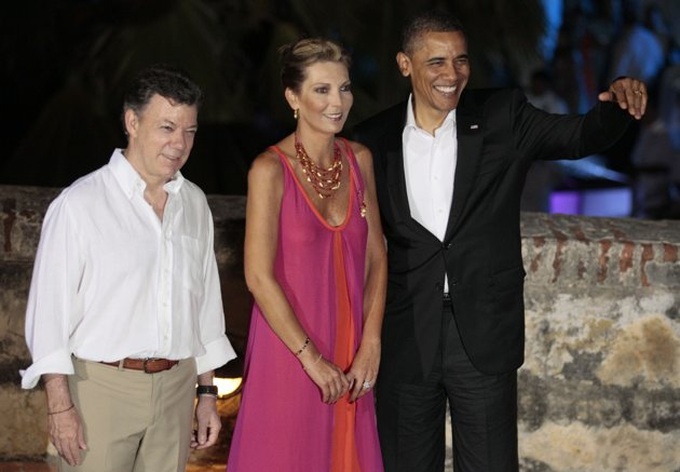Fears of violence marred Saturday's opening of a summit gathering US President Barack Obama and Latin American leaders when four bombs went off in Cartagena and in the Colombian capital.
 |
| President Barack Obama, right, stands with Colombia's first lady Maria Clemencia Rodriguez and Colombia's President Juan Manuel Santos as he greets the media after a dinner during the sixth Summit of the Americas in Cartagena, Colombia, Friday April 13, 2012. (AP Photo/Fernando Llano) |
Two other small bombs exploded near the US Embassy in Bogota, in an area which is also home to important government buildings.
"Nobody was killed, nobody was injured, and there was no damage," a police official told AFP on condition of anonymity.
The incident occurred at around 7:30 pm local time (0030 GMT Saturday), prompting police units to swarm into the area. But the explosions were followed by two similar ones in Cartagena, host of the two-day Summit of the Americas.
"They occurred near a bus terminal and near a supermarket," General Rodolfo Palomino of the Colombian police told reporters. "There were no injuries and no damage."
It was not immediately clear who carried out the bombings, but Bogota and other major cities have been the site of urban guerrilla attacks for decades.
The Revolutionary Armed Forces of Colombia (FARC) -- now the Americas longest running insurgency -- has been at war with the Colombian government since 1964 and is believed to have 9,000 fighters in mountainous and jungle areas, according to government estimates.
Two issues -- the pros and cons of drug legalization and Cuba's continued exclusion from the summit -- were expected to dominate the summit agenda, highlighting the growing disconnect between Washington and an increasingly assertive and independent Latin American bloc led by powerhouse Brazil.
Before leaving Washington, Obama made it clear in an interview with an association of leading Latin American newspapers, that he rejects the idea of decriminalizing drugs.
Washington would not "legalize or decriminalize drugs because doing so would have serious negative consequences in all our countries in terms of public health and safety," he said.
On Cuba, he insisted that Havana authorities "have shown no interest in changing their relationship with the United States, nor any willingness to respect the democratic and human rights of the Cuban people."
Cuba has never taken part in a Summit of the Americas. And in early March, Colombian President Juan Manuel Santos traveled to the Cuban capital to explain that a lack of consensus had prevented Cuba from being invited this time.
Havana's exclusion however prompted Ecuador's Rafael Correa to stay away while Bolivian President Evo Morales said on arrival Friday that he was convinced the summit would be "the last without Cuba."
There was also uncertainty about the attendance of Venezuela's President Hugo Chavez, who is being treated for cancer.
In another twist, some Secret Service agents sent to Colombia to help protect Obama at the summit have been sent home amid accusations of a sex scandal, officials and reports said Friday.
"There have been allegations of misconduct made against Secret Service personnel in Cartagena, Colombia prior to the president's trip," Secret Service special agent in charge Edwin Donovan said in a statement.
He did not specify the allegations, saying the agents had been replaced and stressing it would not endanger Obama's security.
But at least one of the agents had been involved with prostitutes in the Colombian resort city, the Washington Post said, quoting an official with the Federal Law Enforcement Officers Association.
The summit was also to tackle regional integration, reducing poverty and inequality, immigration, combating transnational crime and increased access to technology.
But uppermost in their minds will be whether to rethink the fight against drugs, which are creating havoc across the region.
Guatemalan President Otto Perez Molina told AFP that he would put forward a proposal to open a high-level dialogue to seek new strategies to combat drug trafficking, including decriminalization and regulation of the drug market.
Late Thursday, Argentine Foreign Minister Hector Timerman said he was hopeful of securing from the summit a "new manifestation of solidarity" with Buenos Aires in its dispute with London over the Falkland islands.
Argentina and Britain this month marked 30 years since they went to war over the disputed South Atlantic islands.
